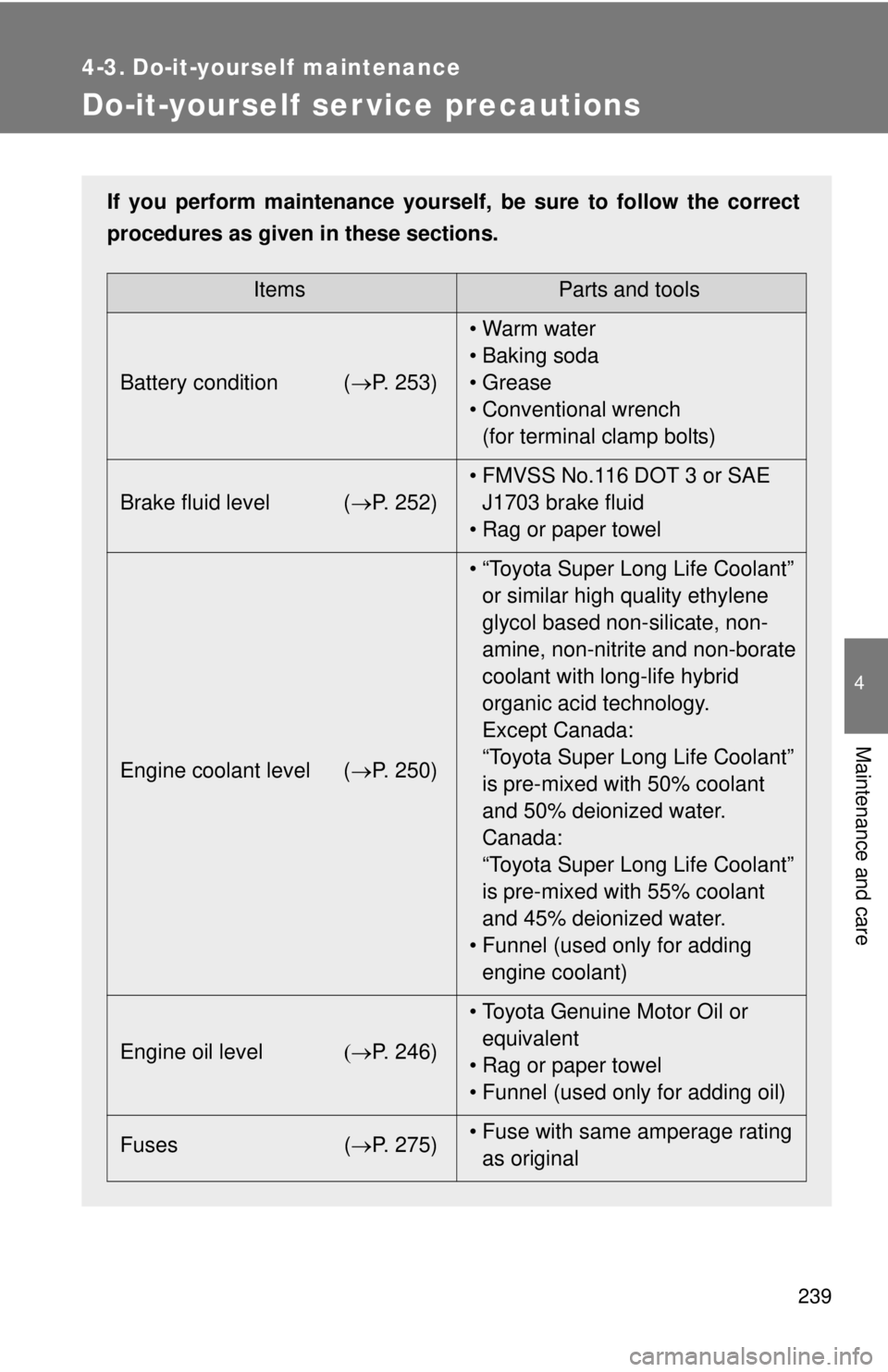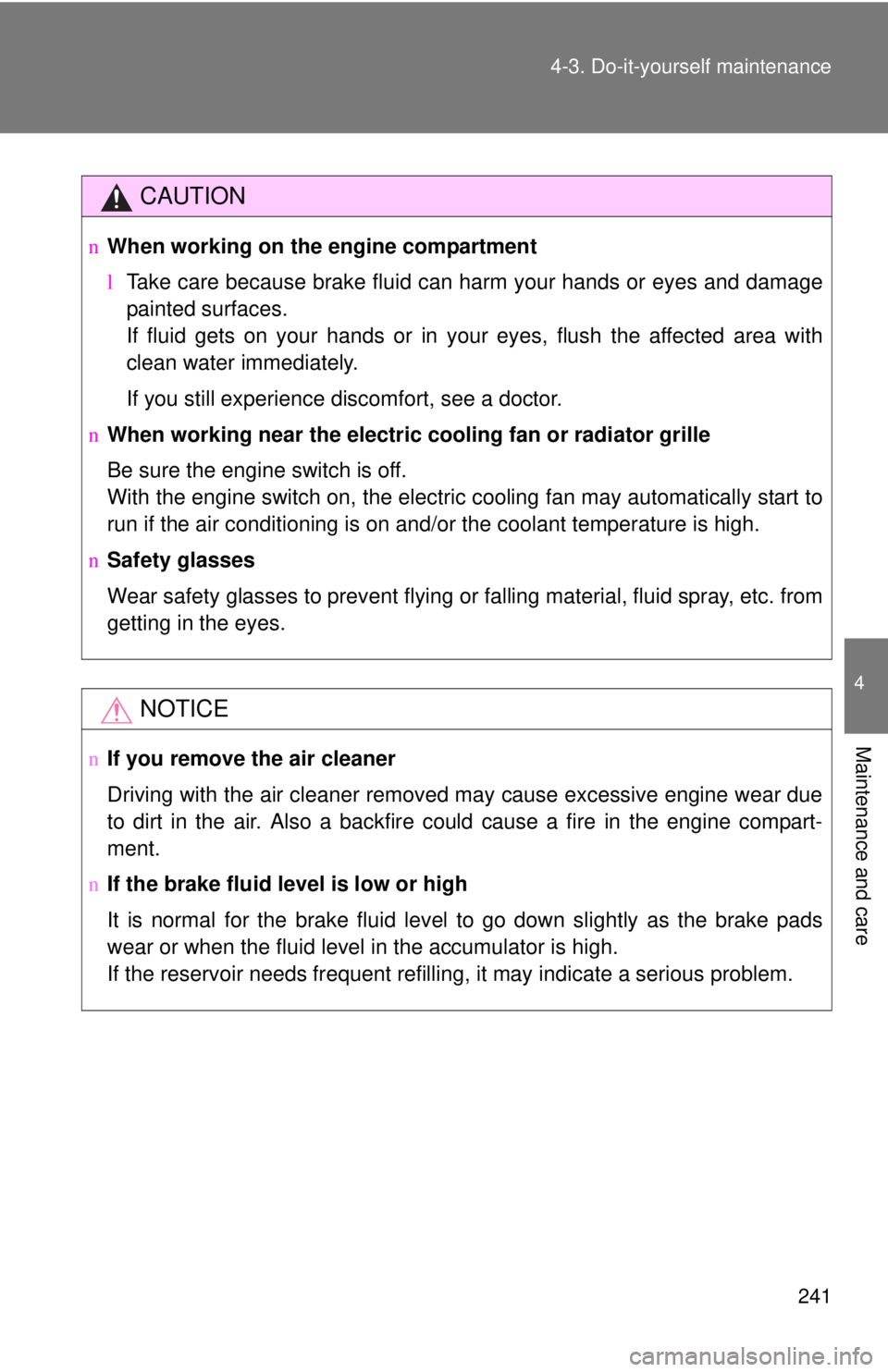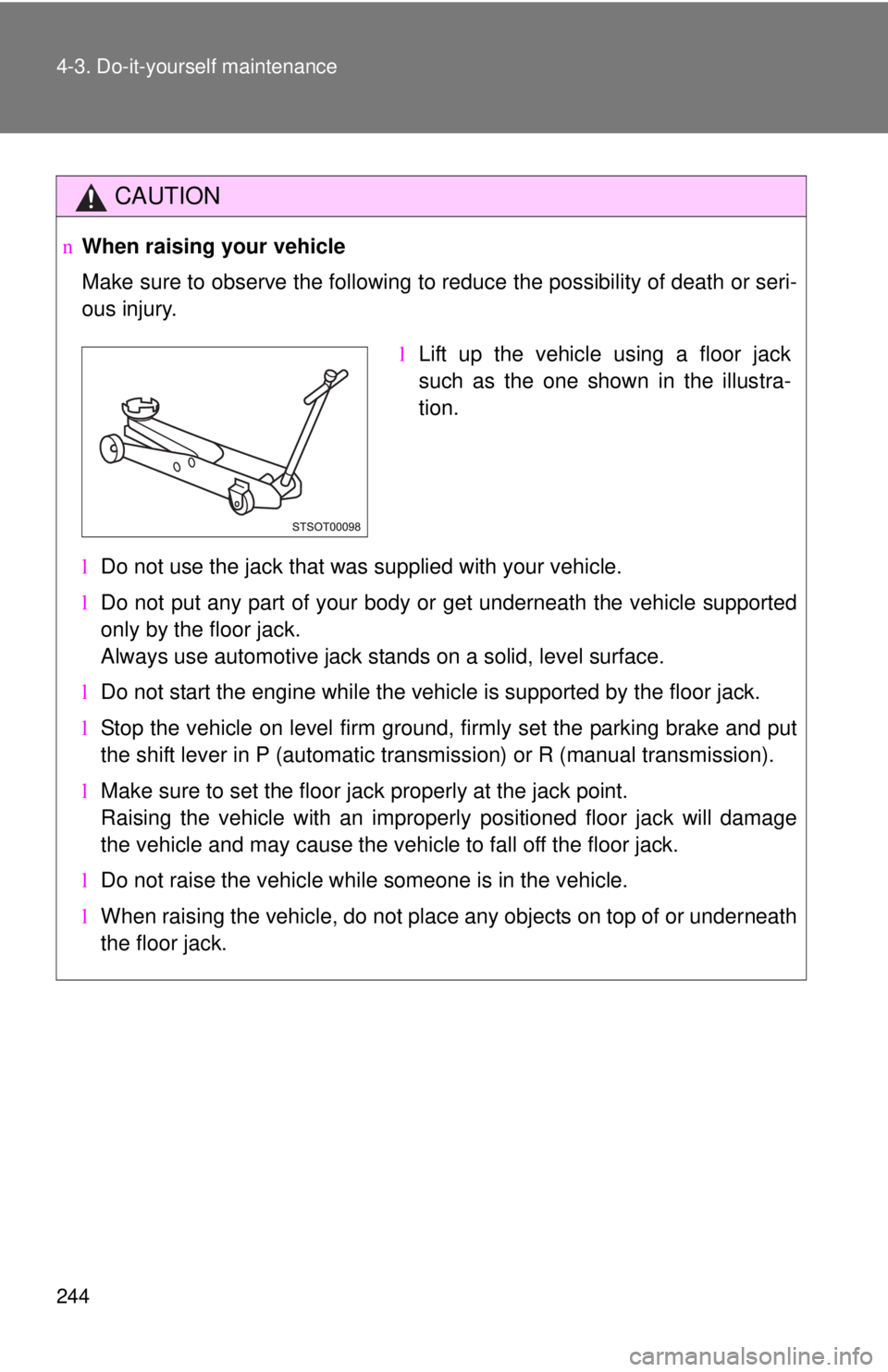Page 246 of 402
235
4-2. Maintenance
4
Maintenance and care
General maintenance
Engine compartment
ItemsCheck points
Battery Maintenance-free. ( →P. 253)
Brake fluid At the correct level? ( →P. 252)
Engine coolant At the correct level? ( →P. 250)
Engine oil At the correct level? ( →P. 246)
Exhaust system No fumes or strange sounds?
Radiator/condenser/hoses Not blocked with foreign matter?
(
→P. 252)
Washer fluid At the correct level? ( →P. 256)
Listed below are the general maintenance items that should be per-
formed at the intervals specified in the “Scheduled
Maintenance
Guide” or “Owner’s Manual Supple ment”. It is recommended that
any problem you notice should be brought to the attention of your
Toyota dealer or qualified service shop for advice.
Page 247 of 402
236 4-2. Maintenance
Vehicle interior
ItemsCheck points
Accelerator pedal • Moves smoothly (without uneven
pedal effort or catching)?
Automatic transmission “Park”
mechanism • Can the vehicle be hold securely
on an incline with the shift lever in
P?
Brake pedal • Moves smoothly?
• Does it have appropriate clear-
ance and correct amount of free
play?
Brakes • Not pull to one side when
applied?
• Loss of brake effectiveness?
• Spongy feeling brake pedal?
• Pedal almost touches floor?
Clutch pedal • Moves smoothly?
• Does it have correct amount of
free play?
Head restraints • Move smoothly and lock
securely?
Indicators/buzzers • Function properly?
Lights • Do all the lights come on?
• Headlights aimed correctly?
Parking brake • Moves smoothly?
• Can hold the vehicle securely on
an incline?
Seat belts • Does the seat belt system oper-
ate smoothly?
• Are the belts undamaged?
Seats • Do the seat controls operate
properly?
Page 250 of 402

239
4
Maintenance and care
4-3. Do-it-yourself maintenance
Do-it-yourself ser vice precautions
If you perform maintenance yourself, be sure to follow the correct
procedures as given in these sections.
ItemsParts and tools
Battery condition ( →P. 253)•Warm water
• Baking soda
• Grease
• Conventional wrench
(for terminal clamp bolts)
Brake fluid level ( →P. 252)• FMVSS No.116 DOT 3 or SAE
J1703 brake fluid
• Rag or paper towel
Engine coolant level ( →P. 250)• “Toyota Super Long Life Coolant”
or similar high quality ethylene
glycol based non-silicate, non-
amine, non-nitrite and non-borate
coolant with long-life hybrid
organic acid technology.
Except Canada:
“Toyota Super Long Life Coolant”
is pre-mixed with 50% coolant
and 50% deionized water.
Canada:
“Toyota Super Long Life Coolant”
is pre-mixed with 55% coolant
and 45% deionized water.
• Funnel (used only for adding engine coolant)
Engine oil level (→P. 246) • Toyota Genuine Motor Oil or
equivalent
• Rag or paper towel
• Funnel (used only for adding oil)
Fuses ( →P. 275)• Fuse with same amperage rating
as original
Page 252 of 402

241
4-3. Do-it-yourself maintenance
4
Maintenance and care
CAUTION
n
When working on the engine compartment
lTake care because brake fluid can harm your hands or eyes and damage
painted surfaces.
If fluid gets on your hands or in your eyes, flush the affected area with
clean water immediately.
If you still experience discomfort, see a doctor.
n When working near the electric cooling fan or radiator grille
Be sure the engine switch is off.
With the engine switch on, the electric cooling fan may automatically start to
run if the air conditioning is on and/or the coolant temperature is high.
n Safety glasses
Wear safety glasses to prevent flying or falling material, fluid spray, etc. from
getting in the eyes.
NOTICE
nIf you remove the air cleaner
Driving with the air cleaner removed may cause excessive engine wear due
to dirt in the air. Also a backfire could cause a fire in the engine compart-
ment.
n If the brake fluid level is low or high
It is normal for the brake fluid level to go down slightly as the brake pads
wear or when the fluid level in the accumulator is high.
If the reservoir needs frequent refilling, it may indicate a serious pro\
blem.
Page 255 of 402

244 4-3. Do-it-yourself maintenance
CAUTION
nWhen raising your vehicle
Make sure to observe the following to reduce the possibility of death or\
seri-
ous injury.
lDo not use the jack that was supplied with your vehicle.
l Do not put any part of your body or get underneath the vehicle supported
only by the floor jack.
Always use automotive jack stands on a solid, level surface.
l Do not start the engine while the vehicle is supported by the floor jack.
l Stop the vehicle on level firm ground, firmly set the parking brake and put
the shift lever in P (automatic transmission) or R (manual transmission).
l Make sure to set the floor jack properly at the jack point.
Raising the vehicle with an improperly positioned floor jack will damage
the vehicle and may cause the vehicle to fall off the floor jack.
l Do not raise the vehicle while someone is in the vehicle.
l When raising the vehicle, do not place any objects on top of or underneath
the floor jack.
lLift up the vehicle using a floor jack
such as the one shown in the illustra-
tion.
Page 256 of 402
245
4-3. Do-it-yourself maintenance
4
Maintenance and care
Engine compar tment
Washer fluid tank (→P. 256)
Engine oil filler cap
( → P. 246)
Engine oil level dipstick
( → P. 246)
Radiator cap
Battery ( →P. 253)
Brake fluid reservoir
( → P. 252)Fuse box ( →P. 275)
Condenser ( →P. 252)
Electric cooling fan
Engine coolant reservoir
( → P. 250)
Radiator ( →P. 252)
Page 263 of 402
252 4-3. Do-it-yourself maintenance
Radiator and condenser
Check the radiator and condenser and clear any foreign objects.
If either of the above parts are extr e
mely dirty or you are not sure of
their condition, have your vehicl e checked by your Toyota dealer.
Brake fluid
nChecking fluid level
The brake fluid level should be
b
etween the MAX and MIN lines
on the reservoir.
n Adding fluid
Make sure to check the fluid type and prepare the necessary items.
CAUTION
n When the engine is hot
Do not touch the radiator or condenser as they may be hot and may cause
burns.
Fluid type FMVSS No.116 DOT 3 or SAE J1703 brake fluid
n Brake fluid can absorb moisture from the air
Excess moisture in the fluid can cause a dangerous loss of braking effi -
ciency. Use only newly opened brake fluid.
Page 264 of 402
253
4-3. Do-it-yourself maintenance
4
Maintenance and care
.
Battery
n
Battery exterior
Make sure that the battery terminals are not corroded and that
there
are no loose connections, cracks, or loose clamps.
Te r m i n a l s
Hold-down clamp
CAUTION
nWhen filling the reservoir
Take care because brake fluid can harm your hands or eyes and damage
painted surfaces.
If fluid gets on your hands or in your eyes, flush the affected area with clean
water immediately.
If you still experience discomfort, see a doctor.
NOTICE
nIf the fluid level is low or high
It is normal for the brake fluid level to go down slightly as the brake pads
wear or when the fluid level in the accumulator is high.
If the reservoir needs frequent refilling, it may indicate a serious pro\
blem.
n If you spill fluid
Be sure to wash it off with water to prevent damage to parts or paint.